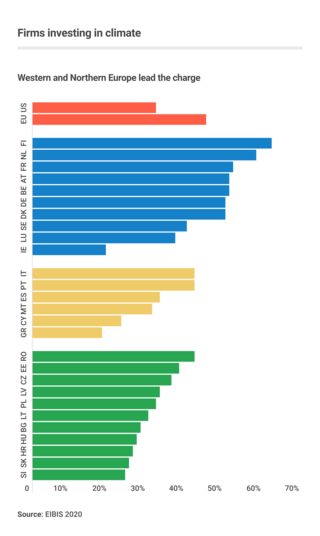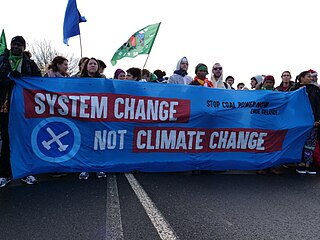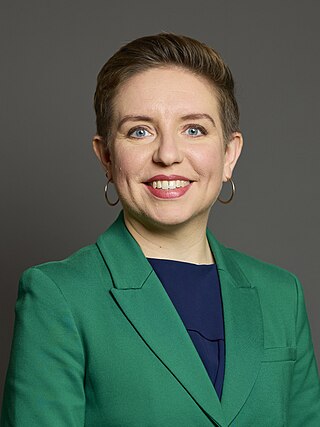Related Research Articles
Environmental finance is a field within finance that employs market-based environmental policy instruments to improve the ecological impact of investment strategies. The primary objective of environmental finance is to regress the negative impacts of climate change through pricing and trading schemes. The field of environmental finance was established in response to the poor management of economic crises by government bodies globally. Environmental finance aims to reallocate a businesses resources to improve the sustainability of investments whilst also retaining profit margins.

A fossil fuel is a carbon compound- or hydrocarbon-containing material formed naturally in the Earth's crust from the buried remains of prehistoric organisms, a process that occurs within geological formations. Reservoirs of such compound mixtures, such as coal, petroleum and natural gas, can be extracted and burnt as a fuel for human consumption to provide energy for direct use, to power heat engines that can propel vehicles, or to generate electricity via steam turbine generators. Some fossil fuels are further refined into derivatives such as kerosene, gasoline and diesel, or converted into petrochemicals such as polyolefins (plastics), aromatics and synthetic resins.
People & Planet is a network of student campaign groups in the UK. It is "the largest student campaigning organisation in the country campaigning to alleviate world poverty, defend human rights and protect the environment."
Disinvestment refers to the use of a concerted economic boycott to pressure a government, industry, or company towards a change in policy, or in the case of governments, even regime change. The term was first used in the 1980s, most commonly in the United States, to refer to the use of a concerted economic boycott designed to pressure the government of South Africa into abolishing its apartheid regime. The term has also been applied to actions targeting Iran, Sudan, Northern Ireland, Myanmar, Israel, China and Russia.

The politics of climate change results from different perspectives on how to respond to climate change. Global warming is driven largely by the emissions of greenhouse gases due to human economic activity, especially the burning of fossil fuels, certain industries like cement and steel production, and land use for agriculture and forestry. Since the Industrial Revolution, fossil fuels have provided the main source of energy for economic and technological development. The centrality of fossil fuels and other carbon-intensive industries has resulted in much resistance to climate friendly policy, despite widespread scientific consensus that such policy is necessary.

Business action on climate change is a topic which since 2000 includes a range of activities relating to climate change, and to influencing political decisions on climate change-related regulation, such as the Kyoto Protocol. Major multinationals have played and to some extent continue to play a significant role in the politics of climate change, especially in the United States, through lobbying of government and funding of climate change deniers. Business also plays a key role in the mitigation of climate change, through decisions to invest in researching and implementing new energy technologies and energy efficiency measures.

Socially responsible investing (SRI) is any investment strategy which seeks to consider financial return alongside ethical, social or environmental goals. The areas of concern recognized by SRI practitioners are often linked to environmental, social and governance (ESG) topics. Impact investing can be considered a subset of SRI that is generally more proactive and focused on the conscious creation of social or environmental impact through investment. Eco-investing is SRI with a focus on environmentalism.

The fossil fuels lobby includes paid representatives of corporations involved in the fossil fuel industry, as well as related industries like chemicals, plastics, aviation and other transportation. Because of their wealth and the importance of energy, transport and chemical industries to local, national and international economies, these lobbies have the capacity and money to attempt to have outsized influence on governmental policy. In particular, the lobbies have been known to obstruct policy related to environmental protection, environmental health and climate action.
The California State Teachers' Retirement System (CalSTRS) provides retirement, disability and survivor benefits for California's 965,000 prekindergarten through community college educators and their families. CalSTRS was established by law in 1913 and is part of the State of California's Government Operations Agency. As of September 2020, CalSTRS is the largest teachers' retirement fund in the United States. CalSTRS is also currently the eleventh largest public pension fund in the world. As of October 31, 2020, CalSTRS managed a portfolio worth $254.7 billion.

Power Shift Network is a North American non-profit organization made up of a network of youth-led social and environmental justice organizations working together to build the youth clean energy and climate movement. It runs campaigns in the United States and Canada to build grassroots power and advocate for tangible changes on climate change and social justice at local, state, national and international levels in North America. The organization changed its name from Energy Action Coalition in July 2016 in order to reflect its new leadership and it shift from a coalition to a network structure. The Power Shift Network's members, which include other non-profit organizations and student groups focused on environmental justice, social justice, and climate change, focus their organizing and campaigns on campuses, communities, corporate practices, and politics. The Power Shift Network is part of the Global Youth Climate Movement.

350.org is an international environmental organization addressing the climate crisis. Its stated goal is to end the use of fossil fuels and transition to renewable energy by building a global, grassroots movement.

The economics of climate change mitigation is a contentious part of climate change mitigation – action aimed to limit the dangerous socio-economic and environmental consequences of climate change.

Individual action on climate change is about personal choices that everyone can make to reduce the greenhouse gas emissions of their lifestyles. Such personal choices are related to the way people travel, their diet, shopping habits, consumption of goods and services, number of children they have and so on. Individuals can also get active in local and political advocacy work around climate action. People who wish to reduce their carbon footprint, can for example reduce their air travel for holidays, use bicycles instead of cars on a daily basis, eat a plant-based diet, and use consumer products for longer. Avoiding meat and dairy products has been called "the single biggest way" individuals can reduce their environmental impacts.

Climate finance is an umbrella term for financial resources such as loans, grants, or domestic budget allocations for climate change mitigation, adaptation or resiliency. Finance can come from private and public sources. It can be channeled by various intermediaries such as multilateral development banks or other development agencies. Those agencies are particularly important for the transfer of public resources from developed to developing countries in light of UN Climate Convention obligations that developed countries have.
Citizens' Climate Lobby (CCL) is an international grassroots environmental group that trains and supports volunteers to build relationships with their elected representatives in order to influence climate policy. The CCL is a registered 501(c)(4) with approximately $680,000 in revenue in the United States in 2018. Operating since 2007, the goal of CCL is to build political support across party lines to put a price on carbon, specifically a revenue-neutral carbon fee and dividend (CF&D) at the national level. CCL is supported by notable climate scientists James Hansen, Katharine Hayhoe, and Daniel Kammen. CCL's advisory board also includes former Secretary of State George P. Shultz, former US Representative Bob Inglis, actor Don Cheadle, and RESULTS founder Sam Daley-Harris.

The carbon bubble is a hypothesized bubble in the valuation of companies dependent on fossil-fuel-based energy production, resulting from future decreases in value of fossil fuel reserves as they become unusable in order to meet carbon budgets and recognition of negative externalities of carbon fuels which are not yet taken into account in a company's stock market valuation.

The climate movement is a global social movement focused on pressuring governments and industry to take action addressing the causes and impacts of climate change. Environmental non-profit organizations have engaged in significant climate activism since the late 1980s and early 1990s, as they sought to influence the United Nations Framework Convention on Climate Change (UNFCCC). Climate activism has become increasingly prominent over time, gaining significant momentum during the 2009 Copenhagen Summit and particularly following the signing of the Paris Agreement in 2016.

Fossil fuel divestment or fossil fuel divestment and investment in climate solutions is an attempt to reduce climate change by exerting social, political, and economic pressure for the institutional divestment of assets including stocks, bonds, and other financial instruments connected to companies involved in extracting fossil fuels.
The American Council for Capital Formation (ACCF) is an American think tank founded in 1975 by Charls Walker. It is located on the District of Columbia's Connecticut Avenue. Mark Bloomfeld serves as its president and Pinar Cebi Wilber serves as its executive vice president and chief economist.

Carla Suzanne Denyer is a British politician who has served as co-leader of the Green Party of England and Wales alongside Adrian Ramsay since 2021 and as the Member of Parliament for Bristol Central since 2024.
References
- ↑ "Divestment helps local governments fight climate change".
- ↑ "Washington DC debates ditching Exxon and Chevron investments". Archived from the original on 2015-09-21. Retrieved 2015-08-19.
- ↑ "Washington D.C. adds its largest public pension to the fossil fuel divestment movement". 6 June 2016. Retrieved 2016-07-07.
- ↑ "Support the Fossil Fuel Divestment Act of 2013 | Washington DC Chapter". Archived from the original on 2015-09-19. Retrieved 2015-08-19.
- ↑ "Why DC Should Divest from Fossil Fuels < MCAF". 3 December 2013.